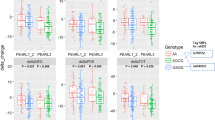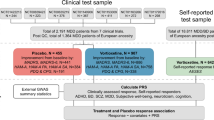Abstract
Generalized anxiety disorder (GAD) is a chronic psychiatric disorder with significant morbidity and mortality. Antidepressant drugs are the preferred choice for treatment; however, treatment response is often variable. Several studies in major depression have implicated a role of the serotonin receptor gene (HTR2A) in treatment response to antidepressants. We tested the hypothesis that the genetic polymorphism rs7997012 in the HTR2A gene predicts treatment outcome in GAD patients treated with venlafaxine XR. Treatment response was assessed in 156 patients that participated in a 6-month open-label clinical trial of venlafaxine XR for GAD. Primary analysis included Hamilton Anxiety Scale (HAM-A) reduction at 6 months. Secondary outcome measure was the Clinical Global Impression of Improvement (CGI-I) score at 6 months. Genotype and allele frequencies were compared between groups using χ2 contingency analysis. The frequency of the G-allele differed significantly between responders (70%) and nonresponders (56%) at 6 months (P=0.05) using the HAM-A scale as outcome measure. Similarly, using the CGI-I as outcome, the G-allele was significantly associated with improvement (P=0.01). Assuming a dominant effect of the G-allele, improvement differed significantly between groups (P=0.001, odds ratio=4.72). Similar trends were observed for remission although not statistically significant. We show for the first time a pharmacogenetic effect of the HTR2A rs7997012 variant in anxiety disorders, suggesting that pharmacogenetic effects cross diagnostic categories. Our data document that individuals with the HTR2A rs7997012 single nucleotide polymorphism G-allele have better treatment outcome over time. Future studies with larger sample sizes are necessary to further characterize this effect in treatment response to antidepressants in GAD.
This is a preview of subscription content, access via your institution
Access options
Subscribe to this journal
Receive 6 print issues and online access
$259.00 per year
only $43.17 per issue
Buy this article
- Purchase on Springer Link
- Instant access to full article PDF
Prices may be subject to local taxes which are calculated during checkout

Similar content being viewed by others
References
Baldwin DS, Nair RV . Escitalopram in the treatment of generalized anxiety disorder. Expert Rev Neurotherapeutics 2005; 5: 443–449.
Gelenberg AJ, Lydiard RB, Rudolph RL, Aguiar L, Haskins JT, Salinas E . Efficacy of venlafaxine extended-release capsules in nondepressed outpatients with generalized anxiety disorder: a 6-month randomized controlled trial. JAMA 2000; 283: 3082–3088.
Rickels K, Downing R, Schweizer E, Hassman H . Antidepressants for the treatment of generalized anxiety disorder. A placebo-controlled comparison of imipramine, trazodone, and diazepam. Arch Gen Psychiatry 1993; 50: 884–895.
Rickels K, Rynn M, Iyengar M, Duff D . Remission of generalized anxiety disorder: a review of the paroxetine clinical trials database. J Clin Psychiatry 2006; 67: 41–47.
Rickels K, Rynn M . Pharmacotherapy of generalized anxiety disorder. J Clin Psychiatry 2002; 63 (Suppl 14): 9–16.
Andrews G, Sanderson K, Slade T, Issakidis C . Why does the burden of disease persist? Relating the burden of anxiety and depression to effectiveness of treatment. Bull World Health Organ 2000; 78: 446–454.
Pollack MH . Refractory generalized anxiety disorder. J Clin Psychiatry 2009; 70 (Suppl 2): 32–38.
Kato M, Serretti A . Review and meta-analysis of antidepressant pharmacogenetic findings in major depressive disorder. Mol Psychiatry 2010; 15: 473–500.
Tiwari AK, Souza RP, Muller DJ . Pharmacogenetics of anxiolytic drugs. J Neural Transm 2009; 116: 667–677.
Rush AJ, Fava M, Wisniewski SR, Lavori PW, Trivedi MH, Sackeim HA et al. Sequenced treatment alternatives to relieve depression (STAR*D): rationale and design. Control Clin Trials 2004; 25: 119–142.
McMahon FJ, Buervenich S, Charney D, Lipsky R, Rush AJ, Wilson AF et al. Variation in the gene encoding the serotonin 2A receptor is associated with outcome of antidepressant treatment. Am J Hum Genet 2006; 78: 804–814.
Lucae S, Ising M, Horstmann S, Baune BT, Arolt V, Muller-Myhsok B et al. HTR2A gene variation is involved in antidepressant treatment response. Eur Neuropsychopharmacol 2010; 20: 65–68.
Horstmann S, Lucae S, Menke A, Hennings JM, Ising M, Roeske D et al. Polymorphisms in GRIK4, HTR2A, and FKBP5 show interactive effects in predicting remission to antidepressant treatment. Neuropsychopharmacology 2010; 35: 727–740.
Uher R, Huezo-Diaz P, Perroud N, Smith R, Rietschel M, Mors O et al. Genetic predictors of response to antidepressants in the GENDEP project. Pharmacogenomics J 2009; 9: 225–233.
Rickels K, Etemad B, Khalid-Khan S, Lohoff FW, Rynn MA, Gallop RJ . Time to relapse after 6 and 12 months’ treatment of generalized anxiety disorder with venlafaxine extended release. Arch Gen Psychiatry 2010; 67: 1274–1281.
Norton N, Owen MJ . HTR2A: association and expression studies in neuropsychiatric genetics. Ann Med 2005; 37: 121–129.
Strome EM, Clark CM, Zis AP, Doudet DJ . Electroconvulsive shock decreases binding to 5-HT2 receptors in nonhuman primates: an in vivo positron emission tomography study with setoperone. Biol Psychiatry 2005; 57: 1004–1010.
Drevets WC . Neuroimaging studies of mood disorders. Biol Psychiatry 2000; 48: 813–829.
Peremans K, Audenaert K, Hoybergs Y, Otte A, Goethals I, Gielen I et al. The effect of citalopram hydrobromide on 5-HT2A receptors in the impulsive-aggressive dog, as measured with 123I-5-I-R91150 SPECT. Eur J Nucl Med Mol Imaging 2005; 32: 708–716.
Aloyo VJ, Berg KA, Spampinato U, Clarke WP, Harvey JA . Current status of inverse agonism at serotonin2A (5-HT2A) and 5-HT2C receptors. Pharmacol Ther 2009; 121: 160–173.
Berg KA, Harvey JA, Spampinato U, Clarke WP . Physiological relevance of constitutive activity of 5-HT2A and 5-HT2C receptors. Trends Pharmacol Sci 2005; 26: 625–630.
Berg KA, Harvey JA, Spampinato U, Clarke WP . Physiological and therapeutic relevance of constitutive activity of 5-HT 2A and 5-HT 2C receptors for the treatment of depression. Prog Brain Res 2008; 172: 287–305.
Weisstaub NV, Zhou M, Lira A, Lambe E, Gonzalez-Maeso J, Hornung JP et al. Cortical 5-HT2A receptor signaling modulates anxiety-like behaviors in mice. Science (New York, NY) 2006; 313: 536–540.
Freedman ML, Reich D, Penney KL, McDonald GJ, Mignault AA, Patterson N et al. Assessing the impact of population stratification on genetic association studies. Nat Genet 2004; 36: 388–393.
Pritchard JK, Donnelly P . Case-control studies of association in structured or admixed populations. Theor Popul Biol 2001; 60: 227–237.
Devlin B, Roeder K . Genomic control for association studies. Biometrics 1999; 55: 997–1004.
Bacanu SA, Devlin B, Roeder K . The power of genomic control. Am J Hum Genet 2000; 66: 1933–1944.
Peters EJ, Slager SL, Jenkins GD, Reinalda MS, Garriock HA, Shyn SI et al. Resequencing of serotonin-related genes and association of tagging SNPs to citalopram response. Pharmacogenet Genomics 2009; 19: 1–10.
Acknowledgements
This research was supported by US Public Health Research Grant MH065963 (KR) and K08MH080372 (FWL). The data for this study were collected between 2005 and 2009. We want to thank Wyeth Laboratories for providing all study medication. We also thank Rachel Hodge for technical assistance in genotyping and Dana Patsch for assisting in management and quality assurance for this project. This study was registered under clinical trails.gov.Identifier NCT00183274. KR has received honoraria and served as a consultant or on advisory boards to Cephalon, Eli Lilly, Hoffman-La Roche, Jazz Pharmaceuticals, Johnson & Johnson, Novartis Pharmaceuticals, Pfizer, Epix (PreDix) Pharmaceuticals and PGx Health LLC. KR received research grants (issued to the University of Pennsylvania) from AstraZeneca, Epix Pharmaceuticals, Genaissance Pharmaceuticals (PGxHealth LLC), NIMH, Pamlab, Pfizer and Wyeth Laboratories. All other authors report no financial relationships with commercial interests.
Author information
Authors and Affiliations
Corresponding author
Ethics declarations
Competing interests
The authors declare no conflicts of interest.
PowerPoint slides
Rights and permissions
About this article
Cite this article
Lohoff, F., Aquino, T., Narasimhan, S. et al. Serotonin receptor 2A (HTR2A) gene polymorphism predicts treatment response to venlafaxine XR in generalized anxiety disorder. Pharmacogenomics J 13, 21–26 (2013). https://doi.org/10.1038/tpj.2011.47
Received:
Revised:
Accepted:
Published:
Issue Date:
DOI: https://doi.org/10.1038/tpj.2011.47
Keywords
This article is cited by
-
Long-Term Pharmacological Treatments of Anxiety Disorders: An Updated Systematic Review
Current Psychiatry Reports (2016)
-
Post-stroke depression and the aging brain
Journal of Molecular Psychiatry (2013)
-
Interaction between polymorphisms in serotonin transporter (SLC6A4) and serotonin receptor 2A (HTR2A) genes predict treatment response to venlafaxine XR in generalized anxiety disorder
The Pharmacogenomics Journal (2013)
-
Anxiety disorders: genetic mechanisms
e-Neuroforum (2013)



